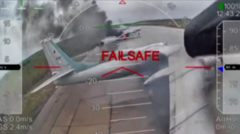Following a recent phone call between Donald Trump and Vladimir Putin, the Russian president indicated a desire for retribution against Ukraine after a drone attack on Russian airbases. This development underscores the persistent volatility and complexity of diplomatic relations amid the ongoing conflict.
Tensions Escalate as Trump Highlights Putin's Plans for Retaliation after Ukraine Drone Strikes

Tensions Escalate as Trump Highlights Putin's Plans for Retaliation after Ukraine Drone Strikes
In a significant update, Donald Trump reveals that Putin intends to retaliate against a Ukrainian drone assault, emphasizing ongoing diplomatic challenges in the Russia-Ukraine conflict.
In a notable revelation, former U.S. President Donald Trump stated that Russian President Vladimir Putin has expressed a definitive need to respond to a drone attack by Ukraine on Russian military installations. The communication marks the first interaction between Trump and Putin since the June 1 incident, where Ukrainian forces executed a surprise drone strike targeting airbases believed to house missile-carrying aircraft.
During the conversation, Trump emphasized the seriousness of Putin's concerns, stating, "President Putin did say, and very strongly, that he will have to respond to the recent attack on the airfields." While Russian officials did not confirm this assertion, earlier remarks from Moscow indicated that various military responses were "on the table."
In a post on social media, Trump warned that the lengthy conversation, which lasted over an hour, was unlikely to yield immediate peaceful resolutions in the ongoing conflict between Russia and Ukraine. Reports from the Russian state news agency RIA Novosti included claims from Putin that Ukraine had attempted to thwart ongoing negotiations and accused the Kyiv government of adopting a "terrorist" role in the context of the war.
Trump informed Putin that the U.S. had not received prior notice regarding Ukraine's drone strike. Concurrently, Ukrainian Minister of Strategic Industries, Yuriy Sak, expressed hope that the U.S. would enact firmer sanctions against Russia in light of its persistent assaults on Ukraine.
Previously, Trump had also articulated a potential timeline for reassessment of U.S. relations with Russia if he suspected Putin was stalling on peace discussions, reprimanding Putin's recent aggression as indicative of recklessness. However, in his latest remarks, he refrained from reiterating any deadlines.
Ukrainian President Volodymyr Zelensky criticized the ineffectiveness of diplomatic talks, stating that previous discussions had failed to yield sustainable peace or halt ongoing hostilities. In pursuit of further defense support, a delegation of Ukrainian officials met with U.S. senators to negotiate arms purchases, forsaking significant breakthroughs in the direct peace talks in Istanbul that ended recently without a ceasefire agreement.
In parallel discussions, Trump and Putin also touched on the situation with Iran, where Trump perceived alignment on preventing nuclear armament, asserting calls for Iran to cease uranium enrichment activities. Despite skepticism from Iran's leadership towards U.S. proposals, both leaders appeared focused on addressing pressing geopolitical concerns amidst the turbulence of the Russia-Ukraine war.




















